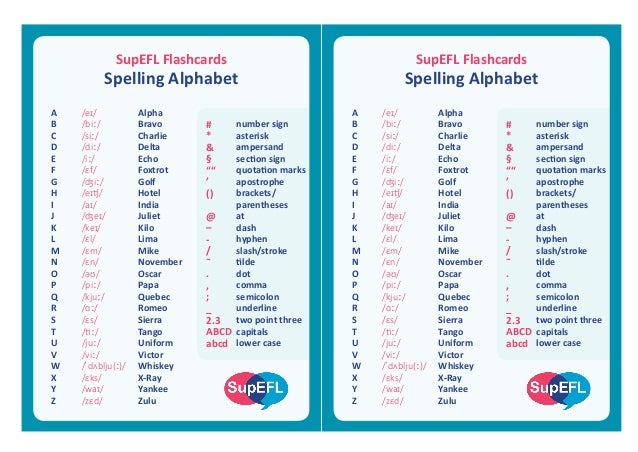
The use of "tt" meant that the letter t would be pronounced at the end of the word.īy adopting these measures to ensure that the letters are pronounced correctly, it becomes a truly international phonetic alphabet, and for this reason it was adopted as the NATO phonetic alphabet. Similarly the spelling for Juliett was adopted because a single "t" is left silent in French. The word alfa was used because because if the spelling alpha was used, it might not be pronounced correctly by non English or French speakers. * Although the normal spellings in plain speech for "alfa" and "Juliett" are "alpha" and "Juliet"", these particular formats for the spellings of these words have been adopted to simplify the comprehension of these words internationally. The international radio communications phonetic alphabet, is given in the table below: ITU / NATO International Radiotelephony Phonetic Alphabet Accordingly the radio phonetic alphabet may also be known as the ICAO phonetic alphabet.Īs the spelling alphabet or phonetic alphabet is used internationally, it is also often called the International Radio Phonetic Alphabet, although NATO alphabet is one of the more widely used notations. The International Civil Aircraft Organisation, ICAO also uses the international radio phonetic alphabet for radio communications between aircraft and ground as well as many other applications. Accordingly references to the NATO phonetic alphabet may also be seen. NATO (North Atlantic Treaty Alliance) has adopted the phonetic alphabet for their radio communications and telecommunications. It has also been adopted by a number of other organisations and therefore may also be known by these names as well. The phonetic alphabet currently used and the one detailed below is often referred to as the ITU phonetic alphabet. To overcome this words beginning with the particular letter were used from the very earliest days of radio to identify a particular letter and avoid confusion and misinterpretation. Even those which may sound very different could be mistaken if signals are poor and interference levels are high Other letters can be difficult to distinguish and this means it is possible for messages to be received incorrectly. Sounds like 'B' and 'T' for 'S' and 'F' are very similar. It has been developed over many years in such a way that the words used provide a minimal risk of being mistaken for another one.

The radio phonetic alphabet is used to represent the relevant letters.

On any two way radio communication link or for other forms of voice telecommunications, the audio bandwidth is limited and interference and distortion may be present. Need for the radiotelephony spelling alphabet By having an internationally recognised spelling alphabet, all operators will be attuned to it and there will be fewer instances of misinterpretation. The radio phonetic alphabet is used internationally and hence it is often called the International Radio or Radiotelephony phonetic alphabet. The more correct term for the radio phonetic alphabet is the International Radiotelephony Spelling Alphabet.Īs the International Radiotelephony Spelling Alphabet is widely called the radio phonetic alphabet, this term will be used here for most of the time. Therefore when used for radio applications a different term is often needed. The words in the phonetic alphabet are used to represent the name of the letter with which it starts - this is actually called acrophony.Īlthough it is often called the radio phonetic alphabet, a phonetic alphabet is a term used within linguists to record detailed information about the sounds of human speech.

The radio phonetic alphabet or spelling alphabet is a set of words that are used to stand for the letters of an alphabet. Often called the radio phonetic alphabet, this alphabet is widely used for two way radio communications, and other telecommunications services to convey letters unambiguously where interference and bandwidth limitations often make it difficult to distinguish accurately between different letters.
#Spelling alphabet english telephone code
Summary Abbreviations RST code Q code Phonetic alphabet International Radio Phonetic Alphabet: NATO Alphabet The radio phonetic alphabet, more correctly be termed the radiotelephony spelling alphabet is used for unambiguously spelling out words by letter, often over radio or telephone connections.


 0 kommentar(er)
0 kommentar(er)
